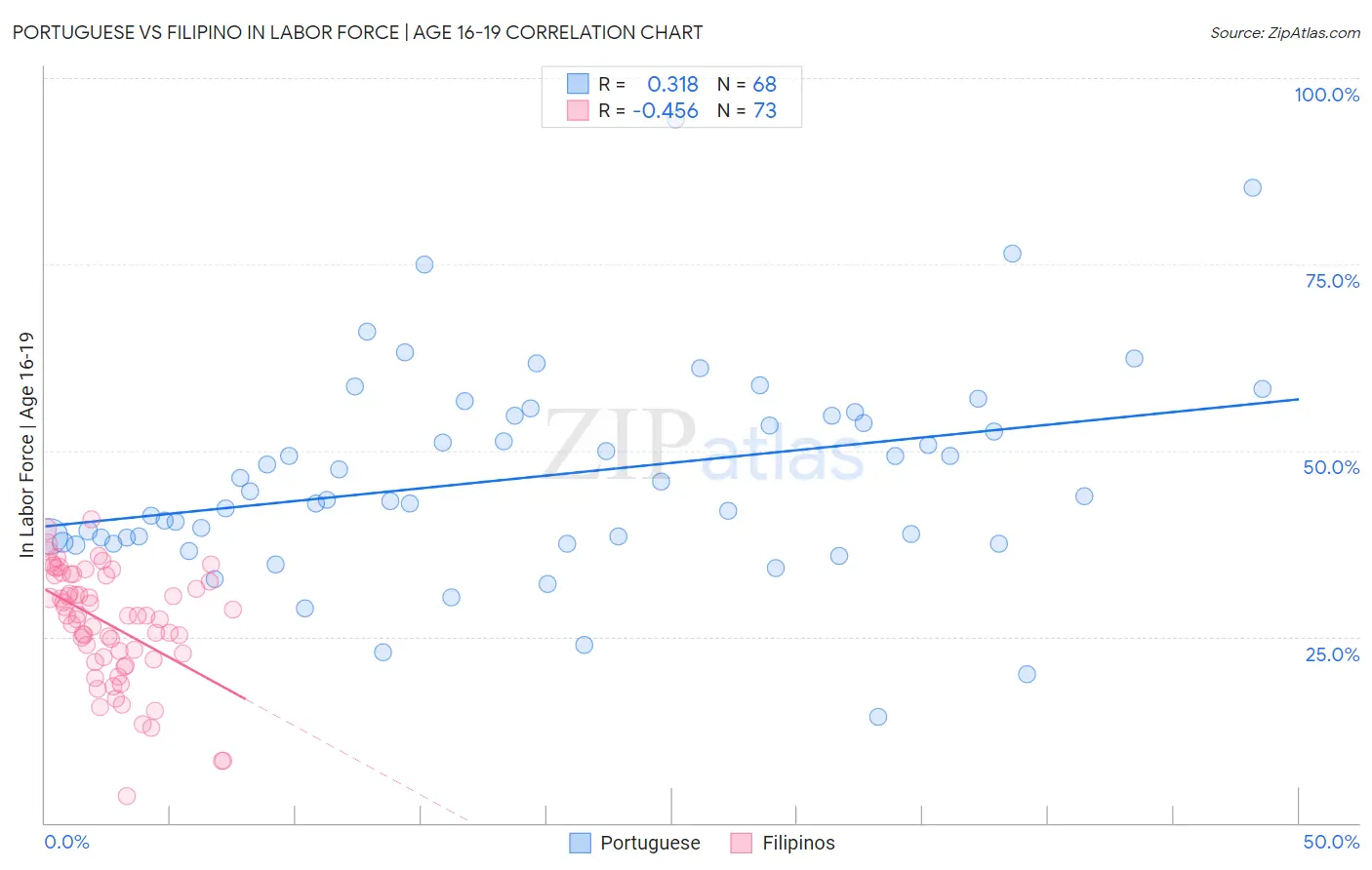Portuguese vs Filipino In Labor Force | Age 16-19
COMPARE
Portuguese
Filipino
In Labor Force | Age 16-19
In Labor Force | Age 16-19 Comparison
Portuguese
Filipinos
40.0%
IN LABOR FORCE | AGE 16-19
99.9/ 100
METRIC RATING
70th/ 347
METRIC RANK
31.7%
IN LABOR FORCE | AGE 16-19
0.0/ 100
METRIC RATING
316th/ 347
METRIC RANK
Portuguese vs Filipino In Labor Force | Age 16-19 Correlation Chart
The statistical analysis conducted on geographies consisting of 449,088,849 people shows a mild positive correlation between the proportion of Portuguese and labor force participation rate among population between the ages 16 and 19 in the United States with a correlation coefficient (R) of 0.318 and weighted average of 40.0%. Similarly, the statistical analysis conducted on geographies consisting of 254,095,508 people shows a moderate negative correlation between the proportion of Filipinos and labor force participation rate among population between the ages 16 and 19 in the United States with a correlation coefficient (R) of -0.456 and weighted average of 31.7%, a difference of 26.3%.

In Labor Force | Age 16-19 Correlation Summary
| Measurement | Portuguese | Filipino |
| Minimum | 14.2% | 3.5% |
| Maximum | 94.4% | 40.8% |
| Range | 80.2% | 37.3% |
| Mean | 46.5% | 26.6% |
| Median | 43.6% | 27.8% |
| Interquartile 25% (IQ1) | 38.0% | 22.1% |
| Interquartile 75% (IQ3) | 54.6% | 33.2% |
| Interquartile Range (IQR) | 16.7% | 11.1% |
| Standard Deviation (Sample) | 14.1% | 7.7% |
| Standard Deviation (Population) | 14.0% | 7.6% |
Similar Demographics by In Labor Force | Age 16-19
Demographics Similar to Portuguese by In Labor Force | Age 16-19
In terms of in labor force | age 16-19, the demographic groups most similar to Portuguese are Potawatomi (40.0%, a difference of 0.050%), Italian (40.1%, a difference of 0.12%), Serbian (39.9%, a difference of 0.17%), Iroquois (39.9%, a difference of 0.17%), and Canadian (40.1%, a difference of 0.18%).
| Demographics | Rating | Rank | In Labor Force | Age 16-19 |
| Northern Europeans | 100.0 /100 | #63 | Exceptional 40.2% |
| Immigrants | Micronesia | 100.0 /100 | #64 | Exceptional 40.2% |
| Kenyans | 100.0 /100 | #65 | Exceptional 40.1% |
| Immigrants | Nonimmigrants | 100.0 /100 | #66 | Exceptional 40.1% |
| Canadians | 100.0 /100 | #67 | Exceptional 40.1% |
| Italians | 99.9 /100 | #68 | Exceptional 40.1% |
| Potawatomi | 99.9 /100 | #69 | Exceptional 40.0% |
| Portuguese | 99.9 /100 | #70 | Exceptional 40.0% |
| Serbians | 99.9 /100 | #71 | Exceptional 39.9% |
| Iroquois | 99.9 /100 | #72 | Exceptional 39.9% |
| Immigrants | Middle Africa | 99.9 /100 | #73 | Exceptional 39.9% |
| Hungarians | 99.9 /100 | #74 | Exceptional 39.8% |
| French American Indians | 99.9 /100 | #75 | Exceptional 39.8% |
| Malaysians | 99.9 /100 | #76 | Exceptional 39.7% |
| Immigrants | Portugal | 99.9 /100 | #77 | Exceptional 39.7% |
Demographics Similar to Filipinos by In Labor Force | Age 16-19
In terms of in labor force | age 16-19, the demographic groups most similar to Filipinos are Immigrants from West Indies (31.7%, a difference of 0.080%), Immigrants from Nicaragua (31.6%, a difference of 0.19%), Cuban (31.8%, a difference of 0.26%), Hopi (31.8%, a difference of 0.42%), and Immigrants from Belize (31.8%, a difference of 0.43%).
| Demographics | Rating | Rank | In Labor Force | Age 16-19 |
| Immigrants | Eastern Asia | 0.0 /100 | #309 | Tragic 32.0% |
| Immigrants | Iran | 0.0 /100 | #310 | Tragic 32.0% |
| Indians (Asian) | 0.0 /100 | #311 | Tragic 31.9% |
| Immigrants | Belize | 0.0 /100 | #312 | Tragic 31.8% |
| Hopi | 0.0 /100 | #313 | Tragic 31.8% |
| Cubans | 0.0 /100 | #314 | Tragic 31.8% |
| Immigrants | West Indies | 0.0 /100 | #315 | Tragic 31.7% |
| Filipinos | 0.0 /100 | #316 | Tragic 31.7% |
| Immigrants | Nicaragua | 0.0 /100 | #317 | Tragic 31.6% |
| Immigrants | Yemen | 0.0 /100 | #318 | Tragic 31.5% |
| Soviet Union | 0.0 /100 | #319 | Tragic 31.4% |
| Ecuadorians | 0.0 /100 | #320 | Tragic 31.4% |
| West Indians | 0.0 /100 | #321 | Tragic 31.3% |
| Tohono O'odham | 0.0 /100 | #322 | Tragic 31.3% |
| Immigrants | Caribbean | 0.0 /100 | #323 | Tragic 31.2% |